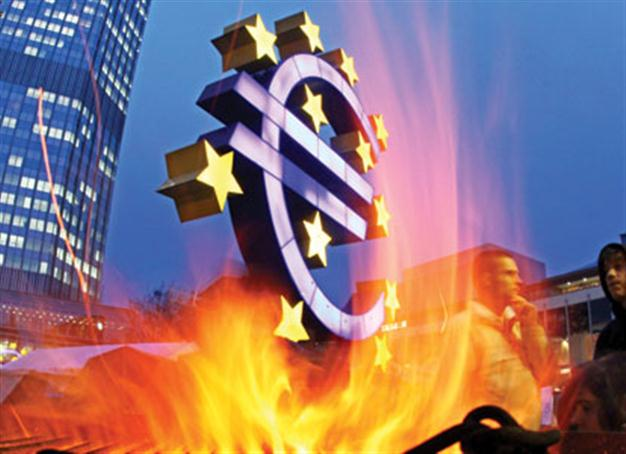
Activists of the Occupy Frankfurt movement have set up a fire place near the Euro sculpture in front of the European Central Bank in Frankfurt, Germany earlier this month. AP photo
The European Central Bank (ECB) stepped in to stem an accelerating sell-off of eurozone government bonds yesterday, traders said, after the United States called for more decisive action to halt a spreading sovereign debt crisis. European shares and the bonds of weaker eurozone countries recovered initially.
“They’re heavily in on Italy and Spain, 2-10 years,” one trader said of the central bank intervention. Yields on Italian government bonds fell just below the 7 percent danger level, widely seen as unaffordable in the long term.
But ECB policymakers continue to reject growing international calls to intervene decisively as Europe’s lender of last resort, stressing it is up to governments to resolve the debt crisis through austerity measures and reforms. Stocks and the euro have tumbled over the last week as bond market contagion spread to AAA-rated France, the eurozone’s second economy and a mainstay of the currency bloc’s rescue fund. The risk premium investors charge for holding French debt rather than benchmark German 10-year Bunds hit another euro lifetime high above 1.9 percentage points on Tuesday.
Obama adds fuel
U.S. President Barack Obama turned up the heat on Europe to act more boldly to extinguish the spreading bushfire.
“Until we put in place a concrete plan and structure that sends a clear signal to the markets that Europe is standing behind the euro and will do what it takes, we are going to continue to see the kinds of market turmoil we saw,” he said on a visit to Australia.
Obama said that whilst there had been progress in putting together unity governments in Italy and Greece, Europe still faced a “problem of political will”.
“We’re going to continue to advise European leaders on what options we think would meet the threshold where markets would settle down. It is going to require some tough decisions on their part,” he said.
European Commission President Jose Manuel Barroso told the European Parliament that the eurozone faced a systemic crisis and fragmenting the European Union was no solution.
He appeared to be referring to calls, notably from French President Nicolas Sarkozy, for a two-speed Europe with a much more integrated eurozone moving ahead of a looser confederation of non-euro members.
“We are indeed now facing a truly systemic crisis that requires an even stronger commitment from all and that may require additional and very important measures,” Barroso said. “We will not make the euro stronger through the fragmentation of the European Union.”
Banks in the eurozone face increasing difficulties in obtaining dollar funding, and while the stresses are nowhere near as acute as they were in the 2008 financial crisis, they have continued to mount despite ECB moves to provide unlimited liquidity to banks.
Asian shares and the euro fell earlier yesterday as signs that rising borrowing costs were affecting France stirred concern that the debt crisis has spread to the region’s core.
“Markets are clearly expecting a circuit breaker to alleviate pressure on periphery bond yields,” said David Scutt, a trader at Arab Bank Australia in Sydney. “If no announcement is forthcoming in the days ahead, one suspects that the situation could unravel fairly quickly.”
With a Brussels-based think-tank warning that France’s economy should be “ringing alarm bells,” Finance Minister Francois Baroin sought to calm fears about public finances.
“We have the necessary room to manoeuvre within the budget to meet our 2012 deficit target even if the economy slows more than expected,” he said in an interview in yesterday’s edition of Les Echos. “Even with growth of 0.5 percent we can cope.”
Baroin told Les Echos he believed the ECB had an important role to play in calming the debt crisis, but he acknowledged, as did Geithner, that Germany had deep reservations.
POLITICIAN-FREE ITALIAN CABINET IN POWER
Mario Monti formed a new technocrat government in Italy yesterday to tackle a major debt crisis threatening the entire eurozone.
The government has the urgent task of tackling a crisis that has pushed Italy’s borrowing costs to untenable levels and brought it to the brink of economic disaster.
Speaking after presenting his cabinet, Monti said: “We feel sure of what we have done and we have received many signals of encouragement from our European partners and the international world. All this will, I trust, translate into a calming of that part of the market difficulty which concerns our country.”
Monti said he would take the crucial economy portfolio himself.
After disputes among the parties which complicated Monti’s task, the new government contained no politicians, as he was reported to have wanted. Monti said the lack of politicians would strengthen rather than weaken the government by enabling it to avoid political disputes and press ahead with vital reforms.
“The absence of political personalities in the government will help rather than hinder a solid base of support for the government in parliament and in the political parties because it will remove one ground for disagreement.”
He said he would present his austerity program to the Senate tomorrow. This is expected to be followed by a confidence vote in both houses of parliament.